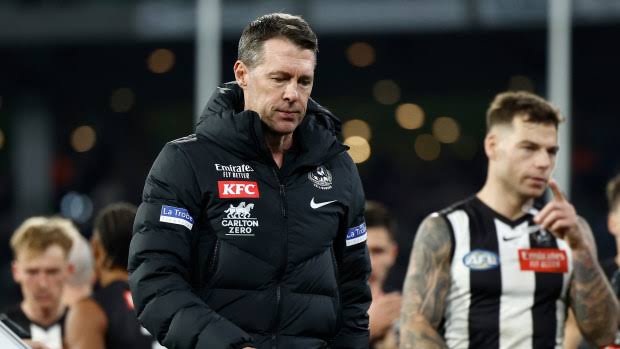**Breaking: Collingwood Captain Darcy Moore Says He Will Never Play with the Team Until Coach Craig McRae Leaves**
In the heart of Melbourne, the news broke like thunder. Darcy Moore, the beloved captain of the Collingwood Football Club, stood before a sea of reporters, his expression a mix of resolve and sadness. “I will never play with this team again until Craig McRae is no longer our coach,” he declared, his voice steady yet tinged with emotion.
The room erupted into a cacophony of questions. Fans were stunned, torn between loyalty to their captain and the enigmatic coach who had led them through triumphs and trials. Just weeks before, the team had tasted victory, but underlying tensions simmered, bubbling to the surface in a moment that felt like a betrayal.
Darcy had always been the heart of Collingwood, a player who inspired both on and off the field. His decision sent shockwaves through the club and its supporters. Behind the scenes, whispers of a rift between him and McRae had circulated for months. It wasn’t just tactical disagreements; it was a clash of philosophies. McRae’s intense focus on metrics and analytics conflicted with Darcy’s instinctual, gut-driven style of leadership.
That evening, as the sun dipped below the horizon, Darcy found solace in the quiet of his home. He replayed the press conference in his mind, grappling with the weight of his words. He remembered the camaraderie he had shared with his teammates, the late-night strategy sessions, and the bond forged through shared victories. But he also recalled the stifling atmosphere in the locker room, the tension that had become palpable.
Days turned into weeks, and the media frenzy continued. Fans rallied around Darcy, holding banners that read “Moore Over McRae.” Social media was ablaze with opinions, some siding with the captain, while others criticized his stance as selfish. The club found itself at a crossroads, caught in a public spectacle that threatened to overshadow their season.
Meanwhile, McRae remained resolute. He refused to comment publicly on the matter, opting to focus on the team’s next game. Yet privately, he felt the weight of Moore’s words. He respected the captain’s courage but questioned whether the decision would fracture the team further. He knew the game was as much about unity as it was about skill.
As the next match approached, the tension was thick. Darcy sat in the stands, watching his team take the field without him. Every cheer from the crowd echoed in his heart, a reminder of what he was missing. Yet, he felt a sense of clarity. This wasn’t just about him; it was about the future of Collingwood, a future he wanted to help shape, even if it meant stepping back for now.
The game was hard-fought, and despite their efforts, the team fell short. After the final siren, Darcy felt a tug of guilt mixed with determination. He knew a decision had to be made, not just for himself but for the players who looked up to him.
In the days that followed, he reached out to McRae. They met in a quiet café, the air heavy with unspoken words. “We need to find common ground,” Darcy began, his voice softer now. “Collingwood is bigger than both of us.”
McRae nodded, the tension between them slowly unraveling. They talked late into the night, sharing their visions for the team, their frustrations, and their hopes. Slowly, they began to understand each other, finding a way to blend analytics with instinct, data with passion.
Months later, as the season progressed, the team’s spirit transformed. Darcy returned to the field, not just as a player but as a bridge between McRae’s strategies and the heart of Collingwood. Together, they forged a new path, one built on mutual respect and understanding. The captain and coach who had once seemed worlds apart now stood united, leading their team toward a promising future.
And as the crowd roared their support, Darcy realized that sometimes, breaking meant rebuilding—a lesson learned on the field, in the locker room, and ultimately, in the heart.
